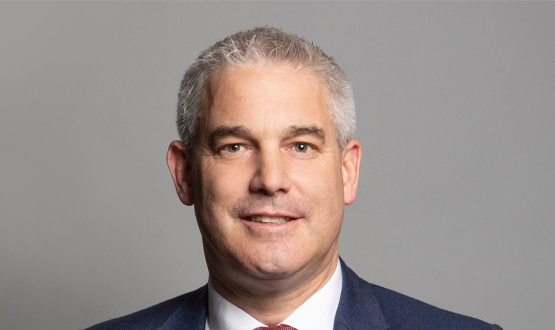Health Secretary: New funding for AI can help rejuvenate the NHS
- 23 June 2023

The government has announced a £21 million funding boost for AI to help reduce the burden on the NHS. In an exclusive to Digital Health News, Secretary of State for Health and Social Care Steve Barclay says support for the technology can help guarantee the sustainability of the health service.
To continue providing the best healthcare within the NHS, we need to embrace innovations. Cutting-edge technology is the key to both improving patient care and supporting staff to do their jobs.
I also am determined to protect tech budgets to make sure the investment secures the long-term future of the NHS.
Artificial Intelligence is one area where we are seeing rapid developments. Yet I am convinced we need to be far bolder in embracing this exciting technology. While there has been much recent debate about the potential risks, AI tools have the potential to transform care. While it must be properly regulated and safely deployed, I want us to go much further and faster in adopting AI in our healthcare.
That’s why I am announcing £21 million of funding to speed up the roll out of AI across the NHS. This will mean earlier diagnosis of conditions, shorter waiting times for treatment and more freedom for clinicians to focus on patient care.
Our AI Diagnostic Fund will allow Trusts to apply for funding to buy high-tech diagnostic imaging equipment that can be deployed ahead of next winter to ensure services are better prepared for the impact of the increased pressure seen at that time of year.
This equipment will include tools that can analyse scans such as chest X-rays, the most common way to diagnose lung cancer, which kills more people in England than any other type of cancer with around 34,800 deaths in the UK every year – that’s 95 every day.
This technology works in the same way that an app on your smartphone can differentiate between a cat or dog in the pictures you take. The software is trained to recognise the difference between healthy and unhealthy scan results, alerting doctors reviewing the images to potential presence of disease.
With over 600,000 chest X-rays performed each month in England, this could mean even more lung cancer patients will be diagnosed earlier so they can begin life-saving treatment in good time.
This innovation builds on the progress we have already made in using AI in the NHS. AI tools to improve stroke diagnosis are now available in 86% of NHS stroke networks.
I can confirm we’re on track to reach 100% by the end of the year.
Through the AI in Health in Care awards, we have already invested £123 million into developing 86 new AI technologies, supporting stroke diagnosis, cancer screening, cardiovascular monitoring and managing disease at home.
This funding has enabled the development of products like Mia by Kheiron Medical Technologies that can assist in screening for breast cancer, the most common cancer in the UK, and DERM by Skin Analytics, which can help distinguish between cancerous and non-cancerous skin lesions.
Technological breakthroughs are happening rapidly and bringing many benefits to patients. But it is vital that NHS staff have the accurate information and reliable guidance to deploy AI safely. To provide that, we recently launched a new AI & Digital Regulations Service to support staff and ensure AI developers and adopters fully understand the regulations governing this technology in the NHS, so they can safely get these tools working for patients as quickly as possible.
In the year when we are celebrating the 75th anniversary of the founding of the NHS, technology is helping us prevent ill health, diagnose diseases earlier, provide more effective treatments with faster recovery times, and allowing patients to manage their conditions in the comfort of their own homes.
I firmly believe AI will be at the heart of the way we continue improving health and care service in this country and guarantee that the NHS is there for another 75 years and beyond.



